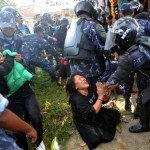THE past few weeks have seen serious crackdowns on the basic freedoms of Tibetans in Nepal. These seem to indicate a worrying trend of Kathmandu distancing itself from the exile community in order to appease its powerful neighbour. In a classic case of cheque-book diplomacy, Beijing has upped its investment in Nepal in exchange for Nepalese commitment to the “One China Policy” (which decrees that Tibet and Taiwan are “inalienable parts of China’) and intolerance of “anti-Chinese activity”.
Nepal has been a crucial transit route for Tibetans
fleeing their homeland ever since over 20,000 migrated to Nepal following the 1959 Tibet Uprising. Refugees were issued ID cards and benefitted from unofficial economic integration. An informal agreement was then made between the Nepalese government and the UN high commissioner for refugees in which Kathmandu pledged to facilitate Tibetans travelling through Nepal en route to India.
In the past two decades, however, this hospitality has waned, arguably under pressure from Beijing. Kathmandu no longer issues refugee ID cards, leaving Tibetans in Nepal with no legal identity or able to own property, be lawfully employed or receive travel documentation. According to reports from The New Yorker and Time magazine, Nepalese police have even been apprehending Tibetans inside Nepal and returning them to China at gunpoint. In 2012, WikiLeaks revealed that China “rewards [Nepalese forces] by providing financial incentives to officers who hand over Tibetans attempting to exit China”.
A number of high-profile cases this month have involved the Nepalese government tightening its grip on Tibetan refugees. Eleven were arrested in Nepal in the aftermath of the National Tibetan Uprising Day on March 10. In the week running up to the event, a home ministry spokesman announced that the government was making “necessary security arrangements in areas deemed sensitive to foil any untoward incidents and a letter was issued to Tibetan activists asking them not to publicly observe the March 10 anniversary because “activities against China violate Nepal’s law”.
Media attention has also focused on the Nepalese authority’s refusal to return the body of Drupchen Tsering, who self-immolated in Kathmandu, to the Tibetan community so that they can carry out the final rites of Buddhist custom. Despite repeated appeals from Tibetans and their supporters to release the body, the Nepalese authorities secretly cremated his body on March 25. They maintained that his body would be released only to his family (who are in Tibet and therefore unable to claim the body) or diplomatic representatives (most likely meaning Chinese diplomats). This decision came despite an international campaign by students for a Free Tibet urging Nepal to “respect the basic rights of Tibetan refugees and not kowtow to China’s growing influence”.
While distancing itself from the Tibetan exile community, the Nepalese government has been cosying up to Beijing in a series of meetings this month with the new Chinese Ambassador to Nepal, Wu Chuntai. By the end of 2013, annual trade between the two countries is expected to hit $1.5 billion, a 25% increase since last year with Chinese-funded projects such as a $1.6bn hydropower plant nearing completion.
For the estimated 20,000 Tibetan refugees living in Nepal and the hundreds wishing to escape Tibet each year, China’s ability to buy seemingly limitless influence in Kathmandu is deeply worrying.







 Print
Print Email
Email